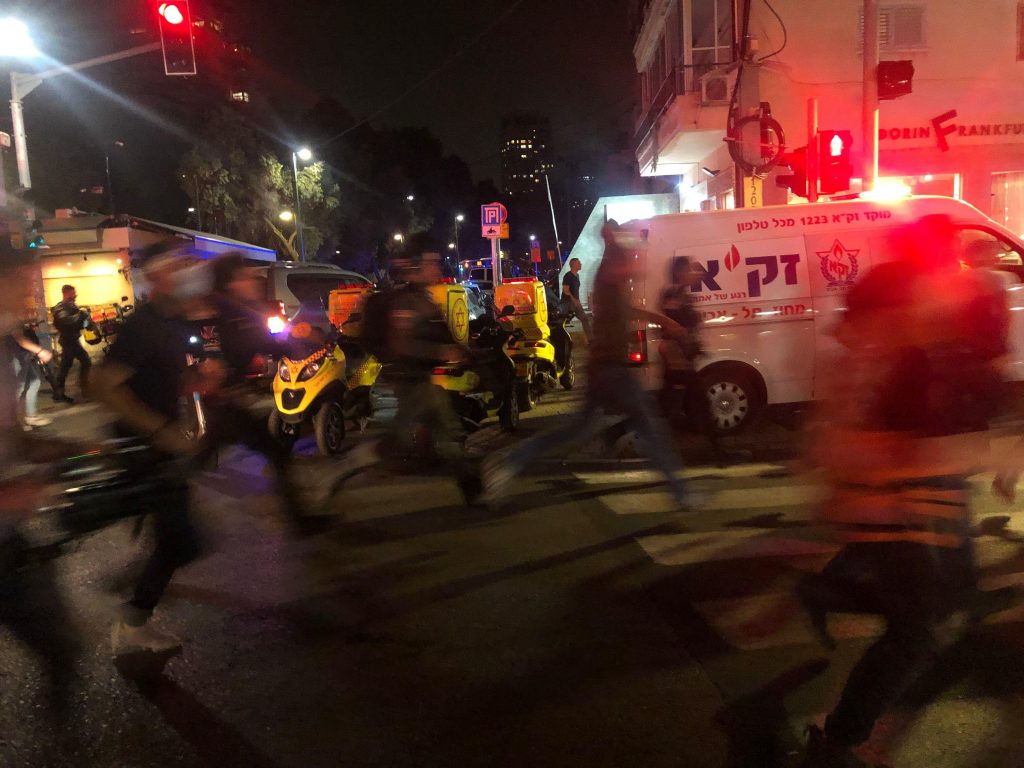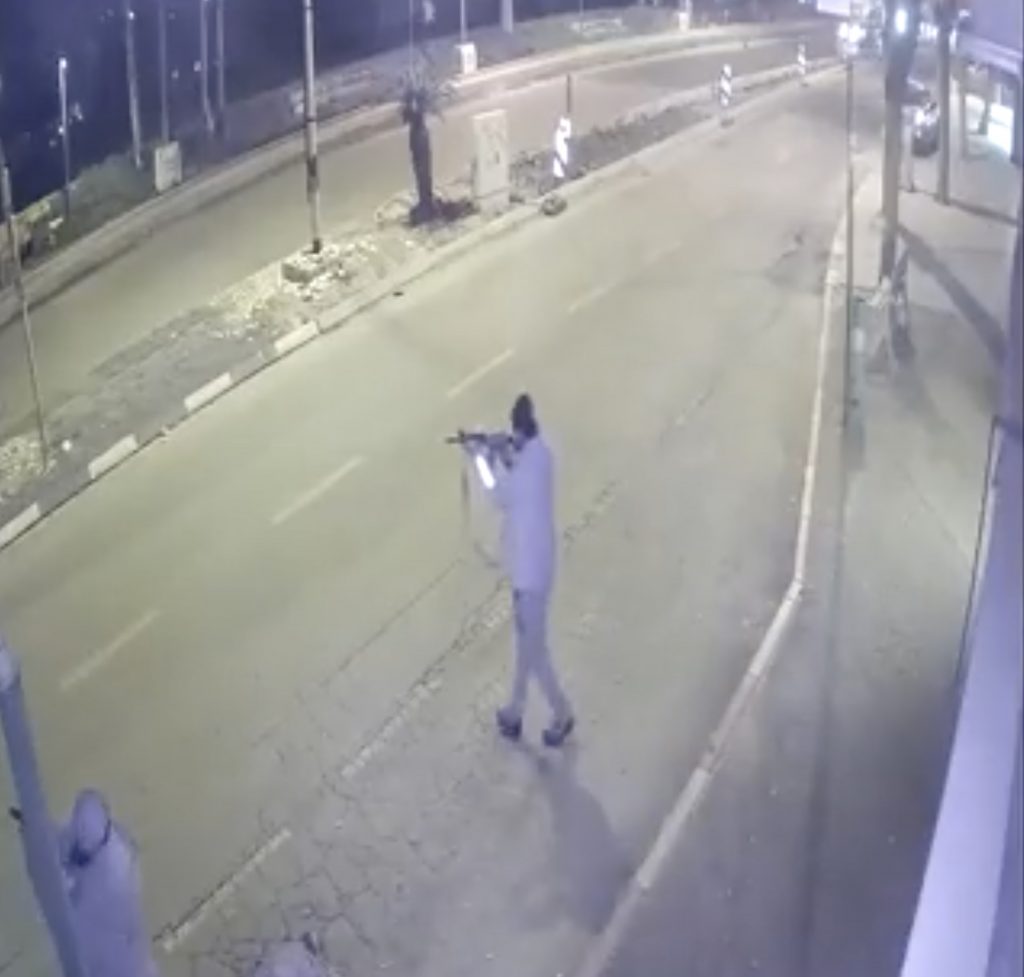Australia/Israel Review
A terror wave explained
May 30, 2022 | Danielle Pletka

Multiple causes, but incitement is key
Seven terrorist attacks from late March to early May left 19 Israelis dead. Some attacks were beyond gruesome, with the attacker wielding an axe. Others were shootings in crowded city cafes. In one attack, a victim shielded his fiancée and died in the act. In another, a teen girl was motivated by the death of her boyfriend to stab a Jew. Israeli authorities expect the terror wave, the worst in many years, to continue. The perpetrators have all been arrested or killed, but Israeli authorities expect there are more to come.
Experts agree that there is no one theme, no one group that can claim responsibility. Hamas, the terrorist group that governs Gaza, celebrated each murder, but the Israeli Government hasn’t fingered the group for plotting attacks. ISIS took credit for another. In the United States, these might be called “lone-wolf” killings, though the presence of so many terrorist groups around Israel – Hamas, Palestinian Islamic Jihad (PIJ), Hezbollah, al-Qaeda, and ISIS, all generically promoting violence – renders the label pointless. To the dead, sponsorship is not really the point. So what’s behind the uptick in killings?
Some have fingered Palestinian anomie, or worse yet, Sunni anomie: losing wars, terrible leaders, failed battles for supremacy, democracy, everything. Others have blamed Ramadan, the Islamic holy month, traditionally (though hardly Quranically) a time of increased violence.
Traditionalists have cast the Israelis as the villains, with heavy handed interventions on the Temple Mount in the wake of Palestinian violence and the usual tension between Arabs and Jews. Still others have harked back to the Sheikh Jarrah controversy – a mundane Jerusalem housing matter that escalated into a symbolic battle for ownership of Jerusalem. It contributed to last year’s 11-day war and tensions are still simmering.
Many also believe that increased incitement over social media, including Telegram, Facebook, WhatsApp and other platforms has encouraged young men to kill. It will be worth keeping an eye on whether the shooting death of Palestinian American journalist Shireen Abu Akleh on May 11 will inflame tensions further. Abu Akleh was killed while IDF forces were exchanging gunfire with armed Palestinians near the Jenin refugee camp, though it’s unclear whether her death was caused by IDF or Palestinian fire.
If all of this feels like the same story, different day, in the endless Israeli-Palestinian conflict, there’s a reason for that. The so-called peace process is done for, with even the Democratic Biden Administration – normally a haven for peace processors – preoccupied with inflation, immigration, crime, Russia, Ukraine, China, Taiwan, everything but the Middle East. A proposed visit by the President to east Jerusalem, once (and perhaps again) home to a US consulate and de facto “embassy” to Palestine, is unlikely to shake things up.
A smarter approach by the United States would look at the topography of the Palestinian people and think more clearly about how to address their problems rather than falling back on the two-state solution as the answer to everything.

Twin gunmen attack in Hadera, March 27 (Screenshot)
First, what do Palestinians believe? Fine work by both the Washington Institute for Near East Policy and veteran Palestinian pollster Khalil Shikaki lay bare part of the trouble. Almost half of Palestinians polled believe “armed struggle” is the solution to their problems. Fully 58% oppose a two-state resolution; 70% oppose “unconditional return to negotiations with Israel”; almost as many oppose dialogue with the United States. Most troubling of all, “73% believe the Qur’an contains a prophecy about the demise of the state of Israel; but only 32% think the year for this demise is 2022.”
Yikes, “only” 32% (and it’s already May!).
Pre-pandemic crowd-sourced polling done by the Washington Institute indicated an almost across-the-board trend among Palestinians toward more pessimism about the future, less realistic aspirations for victory in conflict, increased commitment to the return of all “historically Palestinian” lands, and diminished support for a two-state resolution. While support for a new mass uprising or intifada was also low (for a variety of reasons, including lack of confidence in Palestinian leadership), there remained an overall commitment to violent means.
Another source of trouble is the Palestinian economy: vulnerable before COVID and uniquely dependent on foreign assistance, Palestinians endured a dramatic economic downturn, job losses and a continued contraction of aid inflows – per the World Bank from “27% of GDP in 2008 to 1.8% in 2021.” There has been some post-COVID recovery, with the unemployment rate reportedly “bouncing back” to around (a still unfathomable) 25% in the West Bank and Gaza, though it is likely substantially higher in Gaza. Among younger people, the story is starker: in 2020, 42% of young (15-24) Palestinians were unemployed.
How has this happened? Aid programs out the wazoo, cash transfers from Gulf countries straight into the coffers of both the West Bank and Gaza governments, liberalised Israeli work permits and greater engagement with the Palestinian leadership… and still, 19 dead in six weeks.
Sure, the aid has declined over the last two decades, and more conservative Israeli governments have had harsher policies, permitted more settlement activity, and enforced more stringent border closures. But the Palestinians themselves deserve some agency. And the answer is perhaps less complex than some wish to believe.
There is violence because there is incitement to violence. There is organic hatred toward Israel and Jews for historic and current policy reasons to be sure, but there is also unending political encouragement and glorification of killing (though Palestinian President Mahmoud Abbas condemned several of the recent attacks). There is a loss of faith in democratic self-government because the Palestinian Authority has not conducted a presidential election in 17 years. There is a loss of faith in the peace process because it has not delivered peace. There is rising unemployment because of failed leadership and corruption.
There is a growing sense among Palestinians that they are being left behind by history. Israel has made peace with four Arab states in the last two years, and will likely ink additional agreements before too long – with or without encouragement from Washington. “Palestine” the cause has lost its lustre among all but the most extreme of governments. Should it be any surprise that without work, without economic security, without political and civil society, and with incessant governmental encouragement to kill and glorification of murder, young men turn to violence? It doesn’t excuse it, but it helps to explain it.
In the case of Salafi-jihadis, the United States government understands that defeat is the prelude to extinguishing groups like al-Qaeda and ISIS (though current US policy is another story). In the case of Hamas, PIJ, and even those within the Palestinian Authority who incite terror, however, defeat seems to be off the playbook. The US makes little effort to unseat or even destabilise the terror group holding the reins of power in Gaza, and still less to corral others like PIJ. Sanctions do little to stem the flow of cash from Iran and others. There is scant messaging about the need for fresh leadership, and almost no serious efforts on the part of the US or Europe to dislodge President-for-life Mahmoud Abbas.
Similarly, there is occasional bleating from concerned politicos about incitement and social media glorification of violence, but little serious effort to quash, for example, the use of Facebook to encourage terrorism. There was also once a time when the US prioritised the imperative of economic reform in the Palestinian Authority, putting some real muscle behind former Prime Minister Salam Fayyad, but even that has fallen largely by the wayside.
Israel can do more to mitigate some of the immediate economic problems among the Palestinians, but it has neither the leverage nor the power with Palestinian leaders that is required for real change.
One option is simply to let the Palestinian people wither on the vine, and tolerate the loss of a few dozen Israelis every year to terrorist attacks. Another is to allow “Palestine” to become another Iran, a nexus for greater violence in the Middle East along the lines of Lebanon or Syria. But the better choice is to re-engage on the basis of reality, and seek to loosen the grip of crooks, killers and extremists, look to discredit their failed rule, search and support a new and better generation of leaders and help the Palestinian people find a better path.
Danielle Pletka is a senior fellow specialising in Middle East policy at the American Enterprise Institute. © The Dispatch (www.thedispatch.com), reprinted by permission, all rights reserved.
Tags: Israel, Palestinians, Terrorism






